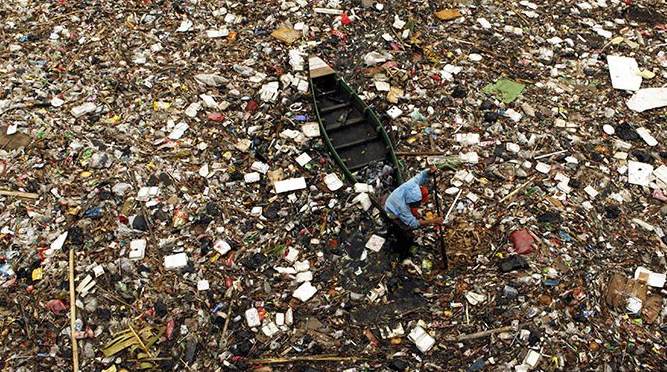Alarm Vietnam in the top 5 countries littering the sea
Ocean Conservancy claims China, Indonesia, the Philippines, Thailand and Vietnam are the top 5 countries that discharge marine products, contributing up to 60% of plastic waste in the world's seas.
The oceans on this planet are flooding our waste: bottles of soda, plastic bags and tons of cigarette butts. The ocean has become a giant trash can of mankind.

Garbage is flooded on the seas in Vietnam.
Worse, floating floating trash on the ocean surface only accounts for 5% of all the waste dumped into the ocean. According to US environmental organization Ocean Conservancy, 95% of the remaining waste is flooded in the ocean, strangling aquatic organisms and threatening aquatic ecosystems.
One more thing, it seems that there are 5 countries leading the way in littering the ocean and causing these dangers. All 5 countries are in Asia.
Page Business Insider said in a recent report, Ocean Conservancy said China, Indonesia, the Philippines, Thailand and Vietnam are the top 5 countries that litter the sea, contributing up to 60% of the plastic waste in the country. the seas of the world.
" With this ratio, we can estimate that by 2025 our ocean contains 3 tons of fish, nearly 1 ton of plastic waste - an unimaginable number due to economic and environmental consequences. now, "said Nicholas Mallos, Ocean Conservancy's marine protection program manager.
Westerners, particularly Americans, are considered to be the main consumers in the world of products such as soda, appliances, sports shoes and items that produce lots of garbage. So why are there only a number of Asian countries, many of which are still quite poor, are the countries that dump the most plastic waste into the sea?
As Asian economies grew, people had a lot of money to buy Marlboro and Sprite products like Westerners, but the developed economy did not create the habit of littering legal landfills.
Of the 5 Asian countries mentioned above, only about 40% of garbage is properly collected. Throughout Asia, rubbish is often piled up in remote landfills and garbage is blown away by the wind, swept into the ocean.
Even legal garbage collection points are sometimes deliberately located near river banks that flow into the sea. The reason, according to the Ocean Conservancy, is: " Garbage will be swept away by heavy rains, and the landfill may contain new waste ."
Business Insider writes that garbage pickers and collectors in Asia are considered anonymous heroes protecting the environment. They bravely interacted with garbage and disease to scavenge, picking up resale plastic pieces for recyclers to get some money.
But these scavengers just pick up high-value garbage - like plastic bottles - not pick up plastic bags, because recyclers don't buy them.
According to Ocean Conservancy, a scavenger spent 10 hours to collect plastic bags, plastic bags only earned 50 cents (11 thousand dong), but if only plastic bottles were collected, they would earn $ 3.70 (83 thousand dong). .
That means they will ignore many types of waste, and these garbage can then be dumped into the sea.
A person in California or Texas buys a bottle of shampoo, but that's too expensive for people in poor villages in Indonesia or the Philippines, and they only buy shampoo in tiny plastic packages.
In many villages in rural Asia, stores sell everything from instant noodle beauty products to small, cheap bags. Thus, poor people can buy. But the result? Companies launch lots of plastic packages in poor Asian countries - and the trash is then located in the ocean.
According to Mallos, although companies do not " produce plastic bags with the intention of dumping them into the ocean ", they should provide products " with world-class logistics, financial, management and marketing networks. "to help solve the problem.
In countries where laws are not yet strict, garbage truck drivers often save time and fuel by dumping garbage right on the side of the road. Such illegal garbage collection points are causing serious consequences for the oceans.
In the Philippines, an island nation, garbage trucks often break the law, research shows that up to 90% of garbage is illegally gathered at sea. Of the five Asian countries above, it is estimated that nearly 1 million plastic trash is dumped into the ocean each year.
According to a study published by Science Magazine, humans release 8 million tons of garbage into the sea each year. If we don't change behavior, Ocean Conservancy says, we will double that rate in just 10 years.
All of that waste has a devastating effect on the sea : causing marine organisms to be choked to death, broken marine ecosystems and heavily destroyed environments, causing a climate change crisis. .
- Vietnam is wasting ... garbage
- Alarm clock history
- Why can the alarm system sound when there is no fire?
- Intelligent alarm clock
- Why do we wake up before the alarm bell?
- Alarm clock with scent
- Why can't firefighters hear the alarm?
- Answer the question of how to wake a deaf person when a fire occurs
- Video: The world's most rude alarm clock
- The device helps you sleep well and the alarm clock
- Vietnam software copyright:
- With this alarm clock, you will always be ready to wake up tirelessly
 Is the magnetic North Pole shift dangerous to humanity?
Is the magnetic North Pole shift dangerous to humanity? Washington legalizes the recycling of human bodies into fertilizer
Washington legalizes the recycling of human bodies into fertilizer Lightning stone - the mysterious guest
Lightning stone - the mysterious guest Stunned by the mysterious sunset, strange appearance
Stunned by the mysterious sunset, strange appearance